In January of 2011, Emma waited at Kennedy airport to catch a night flight headed for Bariloche with a stopover in Buenos Aires, Argentina. After saying farewell to Mom, Dad and her favorite Aunt, she boarded the plane and set off on a 6 month adventure in Patagonia and Chile. The plane ride took over 21 hours with two stopovers, including a taxi ride between airports in Buenos Aires. When she finally arrived in Bariloche, Emma had left the frigid winter behind and stepped into a balmy summer evening.
In the following days, Emma enrolled at La Montana, met her new host family and the other students at the language school. After class activities were offered at the school or students were free to explore the region on foot or by bus. A rustic ferry ride crossed the blue waters of Lake Nahuel Huapi and trails lead to glaciers in the Cerro Lopez Mountains.
One afternoon Emma joined several girls and boarded a local bus for a short ride to El Bolson. The town sported a pond with paddle boat rentals and a counterculture craft and farmer’s market established in the 1960’s. Located in a fertile valley tucked away within the Andes and surrounded by small farms, the town had changed little in the past 50 years. The girls walked off the bus and on their way to the outdoor market saw a man standing in the street with a pony. The mini-horse decked out with a saddle and bridle stood motionless next to his owner waiting for customers. The girls were sure that the little horse was a fake; either stuffed or some type of big toy, until the tiny horse turned his head in their direction.
The pleasant summer days passed by and Emma finished school, said good-bye to her host family and friends. She bought a ticket and climbed aboard another bus. The double-decker bus traveled around the shores of Lake Nahuel Huapi towards Chiloe Island. Emma was headed for an organic farm in Chepu located just off the coast of Chile in the Pacific Ocean. For the remaining few months of her stay in South America, Emma planned to be a volunteer on small organic farms as part of the WWOOF organization. WWOOF was established as a worldwide exchange for organic farmers and volunteers. The farmers were provided with labor and the volunteers gained knowledge about organic farming and received room and board.
The bus slowed to a stop at the border crossing between Argentina and Chile. Police officers crowded the gate blocking the road and watched the bus come to a stop. All of the passengers disembarked and retrieved their bags from the storage compartment. Dutifully the travelers stood near the bus with their luggage as policemen with trained dogs walked back and forth looking for illegal drugs and smuggled goods. Without incident, the police signaled the all’s clear and everyone returned to their seats. The bus driver put the vehicle into gear, pulled away from the border crossing and entered Chile.
The modern tour bus let Emma off in Porta Montt; a small, quiet village on the Pacific Ocean. She stayed in a youth hostel for a few days, explored the town and then boarded a local bus to Chiloe Island. The old, dilapidated bus rumbled along the rural roads, crossed the lake by ferry and continued on towards Chepu.
Bus companies in Chile employed middle-aged bus drivers and young men to take tickets and made sure passengers got off at the right stop. The ticket taker helped travelers with luggage and answered questions. The young ticket taker on Emma’s bus became concerned that she didn’t know where she was going.
“Señorita ¿cuál es su destino?” asked the young man.
“Mi destino es Chepu”, replied Emma.
“¿Donde en Chepu?” he asked again.
At this point, Emma could only repeat her answer. The farmer she had communicated with and arranged to work for had simply emailed: ‘Board the bus for Chepu on Chiloe Island. When it’s time for you to get off I’ll stop the bus.’ To make matters more confusing, the ticket taker had a heavy accent and communication was difficult.
Finally, the young man turned to a venerable gentlemen with gray hair known to everyone on the bus and asked, “Señor, ¿sería usted tan amable de hablar con la joven y saber a dónde va?
The older man and Emma spoke for a few minutes, when suddenly the bus pulled over to the side of the road and a Belgian farmer climbed aboard. He stood next to the driver and peered into the dark bus full of people.
“Is Emma Miran here?” said the farmer.
“I’m Emma,” she said rising to her feet.
Jeroen, a short man with curly blonde hair in his 30’s, politely chatted with the elderly gentleman in Spanish, and then took Emma’s bags. They walked the short distance to his farm which rested on a slight knoll overlooking the scenic countryside. Built of huge picture windows, the farmhouse in essences was a glasshouse. Solar panels provided hot water and a huge cast-iron wood burning stove supplied additional heat. The glass windows let in so much sunlight that the Northern windows needed to be draped to lessen the heat. A short hike from the farmhouse stood a smaller building where WWOOF volunteers stayed. When the two reached the worker’s cabin Emma stowed her gear, and they walked back to the farmhouse for dinner.
Emma stepped into Jeroen’s home and immediately was struck by the size of the furniture. An oversized table and chairs created a fairytale quality to the rooms. The table was already set with plates, and silverware neatly engraved with Jeroen’s family name. Freshly baked bread and homemade jams graced the wooden table. The soft-spoken gentleman suggested Emma sit down as he retreated into the kitchen and retrieved the main course. He placed the food on the table and sat down.
“Why did you move to Chiloe Island?” asked Emma.
“It’s a long story. I studied languages in school. The program I enrolled in only graduated a handful of students every year. Although, I speak ten languages and passed all my foreign language exams, I failed my native language and was not chosen to pass the course. After that I entered culinary school and became a chef. I worked for a while then decided to immigrate to Australia as housing prices were extremely high at home. Before I visited Australia, I took a trip to Patagonia and found prices reasonable and fell in love with the countryside. So I purchased land and moved here,” said Jeroen.
“That’s amazing. How did you build the house?” she asked.
“I designed the house and built it with the help of local workmen. I also made all of the furniture,” he replied.
Emma smiled and wondered why all the furniture was so large but didn’t ask. She helped herself to another slice of bread.
“The bread is very good if you put a slice of cheese on it with jam,” he said passing her a bowl filled with jam.
She sliced the cheese, placed it on the bread and smeared strawberry jam on top. “Yum, this is delicious,” she said.
“Thank you, I bake bread every morning and make my own jam. The cheese is made on a neighboring farm,” he replied.
Emma worked in the fields harvesting potatoes, in large containers she planted fruit tree seeds and collected seeds from plants. Jeroen operated his farm as a minimalist; there were no animals and few crops. Like a modern day Johnny Appleseed, he planted trees and collected seeds. A few days after Emma arrived, another WWOOFer joined her. The two women worked all day in the fields and in the evening joined Jeroen for dinner.
One evening at dinner Jeroen said, “I suggest that on the weekend volunteers leave the farm and explore the local countryside. There are many interesting places to visit.”
“Where do you suggest?” asked Sarah.
“I always send people to a local bed and breakfast not far from here. They have horses and you can take a ride to the beach,” he replied.
The young women threw a few things into their backpacks, boarded a dilapidated local bus and arrived at Los Senderos de Chepu. The rustic bed and breakfast was situated on a hill with views of the Pacific Ocean in the distance. Senora Enriqueta and Don Fernando, the owners, warmly greeted Emma and Sarah. Although they spoke little English, the owners were very friendly and welcoming. Emma and Sarah enjoyed the delicious meals and visited a neighboring farm which sold homemade organic cheese. The next day Don Fernando suggested the women take a half-day trip by horseback to the beach.
Fernando brought the small horses from their pasture and saddled them. The women came down from the house, ready to ride. Emma had ridden horses before, but for Sarah this was her first time.
“Emma your horse is the smallest, only 13.2 hands. Sarah’s horse doesn’t like your horse and will kick if you ride too close. Be careful and don’t fall off,” said Fernando.
“Don’t worry I won’t fall off,” said Emma.
The three riders headed for the beach. The horses slowly walked down the dirt road, with Sarah’s horse lagging behind.
“Give him a kick,” called Fernando.
Grey clouds overcast the sky. The dirt road turned into sandy dunes which lead to a small river about 3 feet deep. The river led to the beach. When the horses reached the river, they prepared to cross.
“Take your feet out of the stirrups when you enter the river. The water is deep,” said Fernando.
The horses crossed the river easily and made their way onto a beach dotted with towering rocks crowned with vegetation. They galloped through the surf passing fisherman with long poles, until the horses stopped. The riders dismounted and walked on foot taking photos. Sarah was glad to be on solid ground as she didn’t feel comfortable going so fast on horseback.
The time came to return home and Fernando decided to take a shortcut across a cow pasture. As soon as Emma’s horse saw the cows, the mare tried to circle and chase the cattle. Emma managed to stop the little white horse from running after the cows when suddenly a young pinto horse appeared. The yearling ran up to Emma’s horse and began following her. Sarah’s horse took an immediate dislike to the young horse and tried to kick him. Fernando and Emma took their whips to the animal trying to drive him off, but it didn’t work. The horse trailed behind trying to stay close to Emma’s horse, intent on following them home.
Suddenly, Emma’s horse took off at a dead run up a long hill leaving the other two horses far behind. Perhaps she could outrun the horse. However that wasn’t the case, the yearling simply ran alongside the little white horse until the trio arrived at the bed and breakfast and stopped. Emma gave up trying to get rid of the little pinto yearling and let her horse eat the grass until Fernando and Sarah caught up with her.
“You are a good horsewoman,” said Fernando.
Without warning, the clouds opened up and a heavy rain fell. The yearling disappeared as quickly as he had appeared, and the riders dismounted. Fernando took the horses and Emma and Sarah returned to the house.
The next morning, Sarah and Emma decided to visit the other end of Chiloe Island and stay in a local youth hostel. A friend of Enriqueta and Fernando stopped by after breakfast and offered the girls a ride in his truck.
“Can we pay you for the trip?” asked Sarah.
“No, there is no need to,” he said.
“We should give you something,” said Emma.
“Well, you can give me just one American dollar. My daughter would like to see it,” he replied.
Sarah and Emma’s stay at the youth hostel was uneventful. They sat in the hostel’s common room as the afternoon turned into evening. The women began to wonder how they would get back to the farm for another week of work. The conversation turned to their wild horse adventure, when suddenly they heard a familiar voice coming from the laundry room. A few moments later, Jeroen walked into the room.
“How was the bed and breakfast?” asked Jeroen.
“I didn’t really enjoy the horses. I’ve never ridden before and the ride was a little scary,” replied Sarah.
“Did anyone fall off?” asked Jeroen.
“No, but I could have,” replied Sarah.
“The last person I sent up there fell off the horse. Next time I’ll make sure I only send experienced riders,” said Jeroen.
“Why are you here?” asked Emma.
“I’m friends with the owner and always do my laundry on Sunday afternoons here,” replied Jeroen.
It wasn’t long before the three traveled back to the farm in Jeroen’s jeep. The weekend adventures came to a close. Sarah and Emma stayed on Chiloe Island for a week and then headed north to another farm in Chile.
Sources:
http://en.wikipedia.org/wiki/San_Carlos_de_Bariloche; http://en.wikipedia.org/wiki/Chilo%C3%A9_Island; http://wwoof.org/

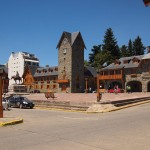
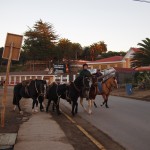
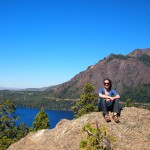
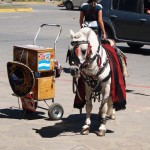
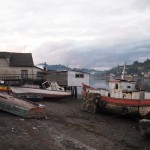
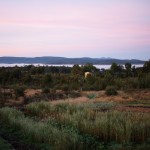
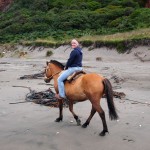
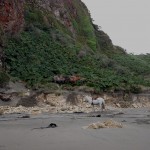
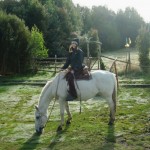
Very nice blog thanks for the good post. keep posting.